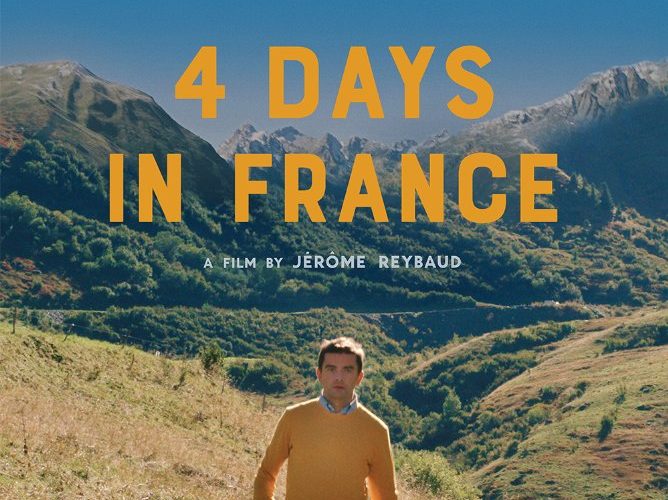Among the sea of headless torsos and shirtless bathroom selfies that populate the symmetrical grid of gay hook-up app Grindr, one is also likely to find users who deem themselves as more of the romantic kind, who claim in their profiles that they are not interested in “meaningless sex.” In 4 Days in France, writer-director Jérôme Reybaud establishes that almost any connection between humans, whether physically or digitally, can never truly be meaningless. As the film opens we meet Pierre (Pascal Cervo) a boyishly handsome 36-year-old who stands in the darkness, shining a light over the body of his sleeping lover Paul (Arthur Igual). Pierre runs the light from head to toes, as if trying to take all of him in one last time, or perhaps, the first. Soon after Pierre is on the road in a white Alfa Romeo, carrying nothing but a small weekender bag and his phone open to Grindr, which will serve as his guide.

We don’t know why Pierre left, but we know how much his departure means when the unsuspecting Paul wakes up and discovers his missing lover has even taken his toothbrush, the look of heartbreak in Igual’s face enough to make any dentist proud. While Pierre is on the road calling men who’ve left their numbers in rest stops, messaging men on Grindr, and helping out hitchhikers in need–who don’t even wink when he reveals he’s not going anywhere in particular–Paul is back in Paris sobbing at the opera wondering when his beloved will return. Since we don’t know what inspired Pierre’s journey, we are denied the luxury of becoming judgmental audience members, since we don’t know who to root for, and whether to hope for Paul and Pierre to reunite or not, we find ourselves like the protagonists, aimless and at the mercy of desire.
Reybaud’s film fits perfectly into the travelogue subgenre, as Pierre and Paul–after he sets out to find him also using Grindr as compass–have a series of chance encounters with some of the same characters, all of whom seem to be eccentrics out of an adult version of Le Petit Prince. While the plethora of characters spread among the journey could justify films of their own, Reybaud knows better than to allow his aimless protagonists to stray too far from the road that is their own story, and yet in an unbearably moving, quite unexpected sequence, we discover the effect Pierre has had in many of the people he encountered. Not because he is some sort of horny Amélie figure setting off a chain of lust wherever he goes, but merely because he is human, and by interacting with someone else has sparked something that wasn’t in them before.
Even though there are no great lessons to be learned in 4 Days in France, Reybaud reveals himself to be a keen humanist, fascinated with the relationship between men and the world around them. Throughout the film we observe Pierre at odds with nature, both astounded and intimidated by its vastness. Whenever the Grindr alert breaks the sacred silence of the fields where Pierre walks, we are reminded of our innate need for interaction and are reassured that there are others waiting for us somewhere.

Another key symbol is the way in which Reybaud recurs to the different stages of man to encompass Pierre’s journey so far. When he runs into an old tutor (Nathalie Richard) she comments on how little he’s changed, which leads to one of Pierre’s few moments of utmost aggression, his tutor’s indiscretion having wounded him when he least expected. During other occasions Pierre has sexual encounters with a young man (who he was) and an older man (who he will become) who stops before the act because they have exchanged too many words and can no longer be anonymous lovers, having rather become acquaintances. Spread throughout the film are also silent encounters with younger men who perhaps not surprisingly look very much like Pierre, and might even share some of his qualities, but due to chance have found themselves lacking the liberty Pierre feels in the city. One of Reybaud’s recurrent themes is the sad truth that a bucolic existence in the country practically denies the fulfillment of any gay man. But Reybaud isn’t only interested in watching men grow, he also presents similar images involving women, with female characters that range from young rebellious girls to seen-it-all-wiseasses like Judith (Liliane Montevecchi) an elderly actress who hands out sage advice, surrounded by theatrical drama, to Pierre and Paul.
It is with Judith where Reybaud reveals what’s the most memorable theme in his film: the reinvention of the French male identity, no longer owned only by the confident Gabins and Depardieus of the nation, but by men who are unsure of who they are and what they want to become. When Judith proclaims the French values as being “liberty, dignity and virility” she is not only giving her friends a blessing, but encouraging those sitting in the dark to go out on a journey with desire as their only companion.
4 Days in France is now in limited release.

